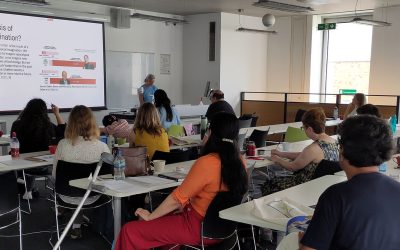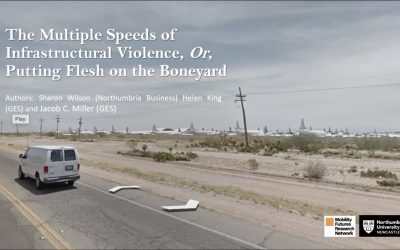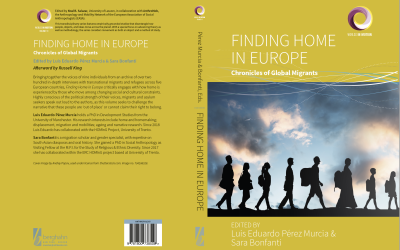Maude Gauthier, a post-doctoral fellow at Lancaster University, writes about her current research on the migration of singles while reflecting on how mobilities studies can help her in the process.
I arrived in Lancaster in September 2015 with the aim of starting my postdoctoral research. My research explores how being single is connected to mobility and (voluntary) migration. I interviewed 16 people (so far) originating from many different countries (Spain, France, the US, Chili, Iran, Lebanon, New Zealand, etc.) and aged from 22 to 45 years old. My background is in communication studies and I am still discovering how mobility studies can benefit my research, for example by exploring how the notion of transition can be mobilized to think the migration of single persons.
Transitions and fantasy-production
The participants in my research speak of opportunities, ranging from professional achievements to new encounters, with their promises of excitement, success and the like. The specifics vary according to their country of origin and their personal biography of mobility but professional achievements and encounters are two broad topics that participants constantly bring up. Mobility produces fantasies and dreams (sometimes accompanied by anxieties), and in the context of a transition from one place to another these dreams hold the promise of great experiences, an interesting or a better life. These fantasies evolve over time into new possibilities for love, career and travel.
A common sense understanding of moving is that of a passing state, to be in transit from one place to another (Cresswell 2006, Sheller & Urry 2006). For many participants, it is a necessary step in a career path. Being single is equally perceived as a temporary, transitory, passing state on the path to coupledom and family life (See for example Freeman 2010 and Kahan 2008). Especially for people who are relatively young, time is suspended and it makes sense to them to postpone getting into a steady relationship. Transit and transition, going from one state, one place, to another, creates a suspension of time. Will they stay “here”? Will they succeed? How will they connect and bond with the people and the places?
Transit and transition, going from one state, one place, to another, creates a suspension of time.
Many participants frame mobility as the “cause” for staying (or in a few cases becoming) single. At this moment in their lives, they explicitly state that they are not focusing on finding “love” but they would like that for “later”, at a date that stays indefinite. A few participants speak of being single as an ideal state and they critique the assumed temporariness of the single status. In both cases, they explain how being single changes the ways they relate to everybody else, by being more open to meeting new people, to opening oneself to others, by making efforts to attend social activities and events.
Why singles?
When I say that I study singles, people are curious to know why. In a hyper-connected world, what does it mean to be “alone”? To be alone means to be without anyone or anything (Full definition here and here). It sounds very dramatic. Single people seem more alone than not-single-people by refusing or being unable to enter a serious couple relationship. In my research, to be alone refers to the dis/connections that are created or exacerbated by migration and despite a sometimes pervasive media environment.
The availability and expected immediacy of communication technologies create a risk of experiencing the “technological absence” of others that can increase feelings of abandonment and loneliness.
Communication technologies are often enjoyed for their ability to connect people who are in different locations, to compensate (partly) for physical absence. But sometimes they also make people realize the great distance between them and long for a better connection. This is especially salient for people who have to deal with big time zone differences or who reached out to someone but did not receive the response they expected. Indeed, the availability and expected immediacy of communication technologies create a risk of experiencing the “technological absence” (Elliot & Urry 2010) of others that can increase feelings of abandonment and loneliness. In other instances, the media are not enough to communicate a whole new universe to people who don’t know much about the culture “here”, and this is experienced as a «disconnect» between two worlds.
Digital media as a tool for engagement
Instead of committing to “relationships” that imply the long-term or some level of seriousness, my participants display various forms of mobile engagement, which include actively seeking new encounters, keeping in touch, sharing house, getting politically involved, volunteering, and exchanging services (i.e. housing, language learning). Even though fantasies of connection are not openly and directly channelled through digital media, the Internet is intrinsic to the ways they meet people.
My participants distance themselves from using digital media with the primary goal of meeting people. Instead they talk about how they use it for short-term rentals, car-sharing, professional networking, learning languages, etc. They connect with hosts and sharers, they complement formal language classes with informal Meetups, etc. Their uses of digital media bring to mind the way some websites act as technologies of hospitality and friendship for mobile people who develop skills for “intimate mobility” (Bialski 2012). They like these forms of engagement, which are temporary, transitory, and not too committing. They do not get “tired” of other people; things are “interesting” and “new” every time (or promise to be). Through these relations they are able to experience a sense of intimacy as well as obtaining other benefits (i.e. financial, professional).
References
Bialski, P. (2012). Becoming Intimately Mobile. Frankfurt: Peter Lang.
Elliot, A., Urry, J. (2010). Mobile Lives. London: Routledge.
Freeman, E. (2010). Time Binds. Durham: Duke University Press.
Kahan, B. (2008). ‘The Viper’s Traffic-Knot’: Celibacy and Queerness in the ‘Late’ Marianne Moore. GLQ: A Journal of Lesbian and Gay Studies, 14(4): 509-535.
Sheller, M., Urry, J. (2006). The new mobilities paradigm. Environment and Planning A, 38 : 207-226.
Thank you: Many thanks to Samuel Thulin for comments on a draft of this blog post, as well as to my supervisor Anne-Marie Fortier and to Anne Cronin for welcoming me to Lancaster.
Maude Gauthier is a post-doctoral fellow at Lancaster University, conducting research on the migration of singles. She completed her PhD in Communication Studies at Université de Montréal with a dissertation entitled ‘Intimité au Québec: étude ethnographique d’un réseau personnel‘.




